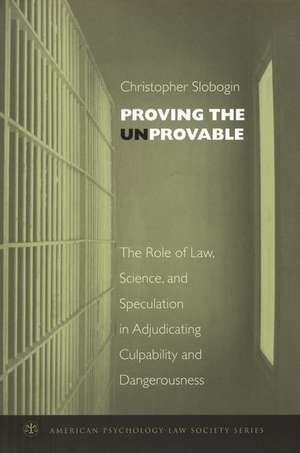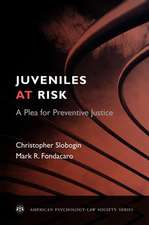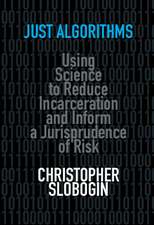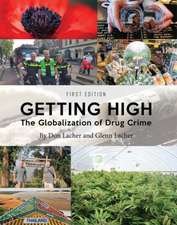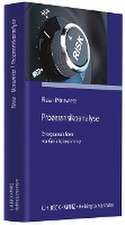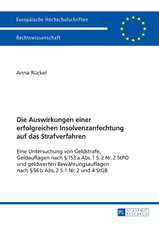Proving the Unprovable: The Role of Law, Science, and Speculation in Adjudicating Culpability and Dangerousness: American Psychology-Law Society Series
Autor Christopher Sloboginen Limba Engleză Hardback – 28 sep 2006
Din seria American Psychology-Law Society Series
- 29%
 Preț: 676.88 lei
Preț: 676.88 lei - 14%
 Preț: 312.86 lei
Preț: 312.86 lei - 27%
 Preț: 346.67 lei
Preț: 346.67 lei - 22%
 Preț: 377.50 lei
Preț: 377.50 lei - 27%
 Preț: 523.20 lei
Preț: 523.20 lei - 31%
 Preț: 396.95 lei
Preț: 396.95 lei - 21%
 Preț: 337.01 lei
Preț: 337.01 lei - 19%
 Preț: 258.01 lei
Preț: 258.01 lei - 27%
 Preț: 649.08 lei
Preț: 649.08 lei - 27%
 Preț: 421.96 lei
Preț: 421.96 lei - 28%
 Preț: 448.88 lei
Preț: 448.88 lei - 31%
 Preț: 420.09 lei
Preț: 420.09 lei - 34%
 Preț: 642.53 lei
Preț: 642.53 lei - 34%
 Preț: 599.41 lei
Preț: 599.41 lei - 34%
 Preț: 523.46 lei
Preț: 523.46 lei - 34%
 Preț: 584.85 lei
Preț: 584.85 lei - 29%
 Preț: 688.57 lei
Preț: 688.57 lei - 6%
 Preț: 769.24 lei
Preț: 769.24 lei - 14%
 Preț: 687.38 lei
Preț: 687.38 lei - 19%
 Preț: 466.21 lei
Preț: 466.21 lei - 24%
 Preț: 478.68 lei
Preț: 478.68 lei - 24%
 Preț: 408.85 lei
Preț: 408.85 lei - 20%
 Preț: 420.40 lei
Preț: 420.40 lei - 19%
 Preț: 355.40 lei
Preț: 355.40 lei - 24%
 Preț: 498.73 lei
Preț: 498.73 lei - 20%
 Preț: 407.16 lei
Preț: 407.16 lei - 23%
 Preț: 483.96 lei
Preț: 483.96 lei - 23%
 Preț: 336.84 lei
Preț: 336.84 lei
Preț: 460.98 lei
Preț vechi: 637.55 lei
-28% Nou
Puncte Express: 691
Preț estimativ în valută:
88.22€ • 91.76$ • 72.83£
88.22€ • 91.76$ • 72.83£
Carte tipărită la comandă
Livrare economică 03-09 aprilie
Preluare comenzi: 021 569.72.76
Specificații
ISBN-13: 9780195189957
ISBN-10: 0195189957
Pagini: 208
Dimensiuni: 236 x 160 x 20 mm
Greutate: 0.47 kg
Editura: Oxford University Press
Colecția OUP USA
Seria American Psychology-Law Society Series
Locul publicării:New York, United States
ISBN-10: 0195189957
Pagini: 208
Dimensiuni: 236 x 160 x 20 mm
Greutate: 0.47 kg
Editura: Oxford University Press
Colecția OUP USA
Seria American Psychology-Law Society Series
Locul publicării:New York, United States
Recenzii
"Should courts stop trying to answer unanswerable questions? In Proving the Unprovable, Professor Slobogin takes on this profoundly important question, and offers an insightful, readable, and persuasive argument for a liberal approach to clinical mental health testimony Proving the Unprovable is a major contribution to our understanding of the law of expert testimony."-- Richard J. Bonnie, John S. Battle Professor of Law, Professor of Psychiatric Medicine, Director, Institute of Law, Psychiatry and Public Policy, University of Virginia
"In Proving the Unprovable, Professor Slobogin has done the undoable: he has produced a probing critique of the legal rules for admitting expert mental health testimony that had me turning the pages as if it were a suspense novel. After trenchantly analyzing current standards for admissibility, he suggests innovative approaches to protect the reasonable contributions that mental health experts can make. I doubt that any expert, no matter how experienced, who reads this book will view his or her task on the witness stand in quite the same way again."-- Paul S. Appelbaum, MD, Professor of Psychiatry, Director, Division of Psychiatry, Law and Ethics, Department of Psychiatry, Columbia University College of Physicians and Surgeons
"Christopher Slobogin's new book on two of the most challenging questions the law poses for itself - the questions of culpability and dangerousness - and the role of mental health experts in trying to answer those question, is classic Slobogin: thoroughly informed, candid, complex and subtle, and yet exceptionally clear and cogent."-- Michael J. Saks, Professor of Law and Professor of Psychology, Arizona State University
"In Proving the Unprovable, Professor Slobogin has done the undoable: he has produced a probing critique of the legal rules for admitting expert mental health testimony that had me turning the pages as if it were a suspense novel. After trenchantly analyzing current standards for admissibility, he suggests innovative approaches to protect the reasonable contributions that mental health experts can make. I doubt that any expert, no matter how experienced, who reads this book will view his or her task on the witness stand in quite the same way again."-- Paul S. Appelbaum, MD, Professor of Psychiatry, Director, Division of Psychiatry, Law and Ethics, Department of Psychiatry, Columbia University College of Physicians and Surgeons
"Christopher Slobogin's new book on two of the most challenging questions the law poses for itself - the questions of culpability and dangerousness - and the role of mental health experts in trying to answer those question, is classic Slobogin: thoroughly informed, candid, complex and subtle, and yet exceptionally clear and cogent."-- Michael J. Saks, Professor of Law and Professor of Psychology, Arizona State University
